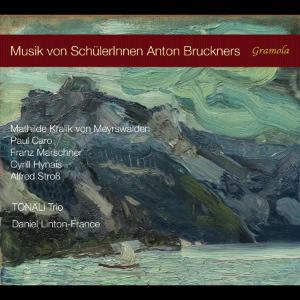
Musik von Schülerlnnen Anton Bruckners
Mathilde Kralik von Meyrswalden (1857-1944)
Piano Trio in F major (1880)
Paul Caro (1859-1914)
Piano Trio in E major, op. 8 (1886)
Franz Marschner (1855-1932)
Piano Trio in C minor, op. 30 (c. 1902)
Cyrill Hynais (1862-1913)
Liebessang in A flat major (1889)
Alfred Stroß (1858-1912)
Theme with Variations in A minor, op., 15 (c. 1888)
TONALi Trio
Daniel Linton-France (piano)
rec. 2021, Mittlerer Saal, Brucknerhaus Linz, Austria
Gramola 99295 [2 CDs: 111]
I am the first to admit that I haven’t “got” Bruckner. I do have a set of his symphonies conducted by Eugen Jochum, and several other individual symphonies as well, but I couldn’t tell you when I last listened to one. I have been at the Proms to hear Kurt Masur conduct the Seventh Symphony, but felt the occasion was more special than the music. With regard to the recording under consideration, I felt that my familiarity with the piano trio genre outweighed my unfamiliarity with Bruckner, especially when it was music once removed from him. These five composers were all students of his at the Conservatory of the Gesellschaft der Musikfreunde in Vienna in the 1880s. Two – Kralik von Meyrswalden and Caro – also received private tutelage from Bruckner.
I thought I recognised Marschner’s name (certainly none of the others), but it turns out that the composer bearing this name with some profile in the music world is Heinrich, considered the most important German opera composer between Weber and Wagner. The two are no relation as far as I can tell.
This is the only recording on Presto’s database to include music by any of the five, and that sadly tells you succinctly all you need to know about this release. There really isn’t much here to get too excited about; it is certainly of more historical interest than musical. As for any influence from the teacher, while I may not be completely au fait with Bruckner’s soundworld, I know enough to not hear much of it in any of these works. Marschner’s trio might come closest, but mainly because of its length – over forty minutes with all three movements being in excess of ten minutes is definitely a Bruckner trait.
Of the three trios, the best is unquestionably that of Paul Caro. A copy of the music was found among Bruckner’s papers, with a handwritten dedication from Caro to his teacher. At around thirty minutes in four movements, the work certainly shows a better sense of concision than Marschner’s (though the ten minute-plus Adagio definitely needed some trimming). If I was to provide a pointer to its style, it might be that of Schubert, with more than a little of Brahms in the mix. We go back a little further influence-wise with the trio of Mathilde Kralik von Meyrswalden having some Beethoven aspects to it. I only provide these reference points as a guide to how the works sound; I am not for a moment suggesting that they have qualities of the trios of the three greats I have mentioned. When we come to Marschner’s sprawling “epic”, I’m not sure where to point you. It is certainly much more of its era in its Romantic melancholy, but it takes the idea of note-spinning to a whole new level.
The last two works are for solo piano, and played by a different pianist (Daniel Linton-France). Hynais’s Liebessang has some pretty moments, but does rather meander for much of its eight-plus minutes, the only sign of real passion is more suggested by hammering the keys than any great heart-rending melody. The Stroß piece didn’t generate any interest for me at all.
It is always difficult to make judgements about performances of music that has not been recorded before. I don’t think the best ensembles and pianists in the world would make much more of these works. I did find the violin timbre a little thin and wiry, but I am aware that this is something I find often, and says more about me than the violinist. The excellent booklet notes provide comprehensive details about the composers and works, and also plenty of information about the careers of the four young performers. However, they don’t indicate much about the TONALi ensemble itself. They do indicate that there is a TONALi organisation based in Hamburg that supports youth in classical music, which is certainly to be applauded.
I wish I could have said something more positive about this release, but I feel Sir Humphrey might have described it as being “courageous” on the behalf of label and artists. Brucknerphiles might be interested in it because of the connection, but they would probably end up disappointed because of the lack of Brucknerian influence. Piano trio aficionados such as myself will find it interesting but equally disappointing because of the lack of much musical interest.
David Barker
If you purchase this recording using a link below, it generates revenue for MWI and helps us maintain free access to the site




















